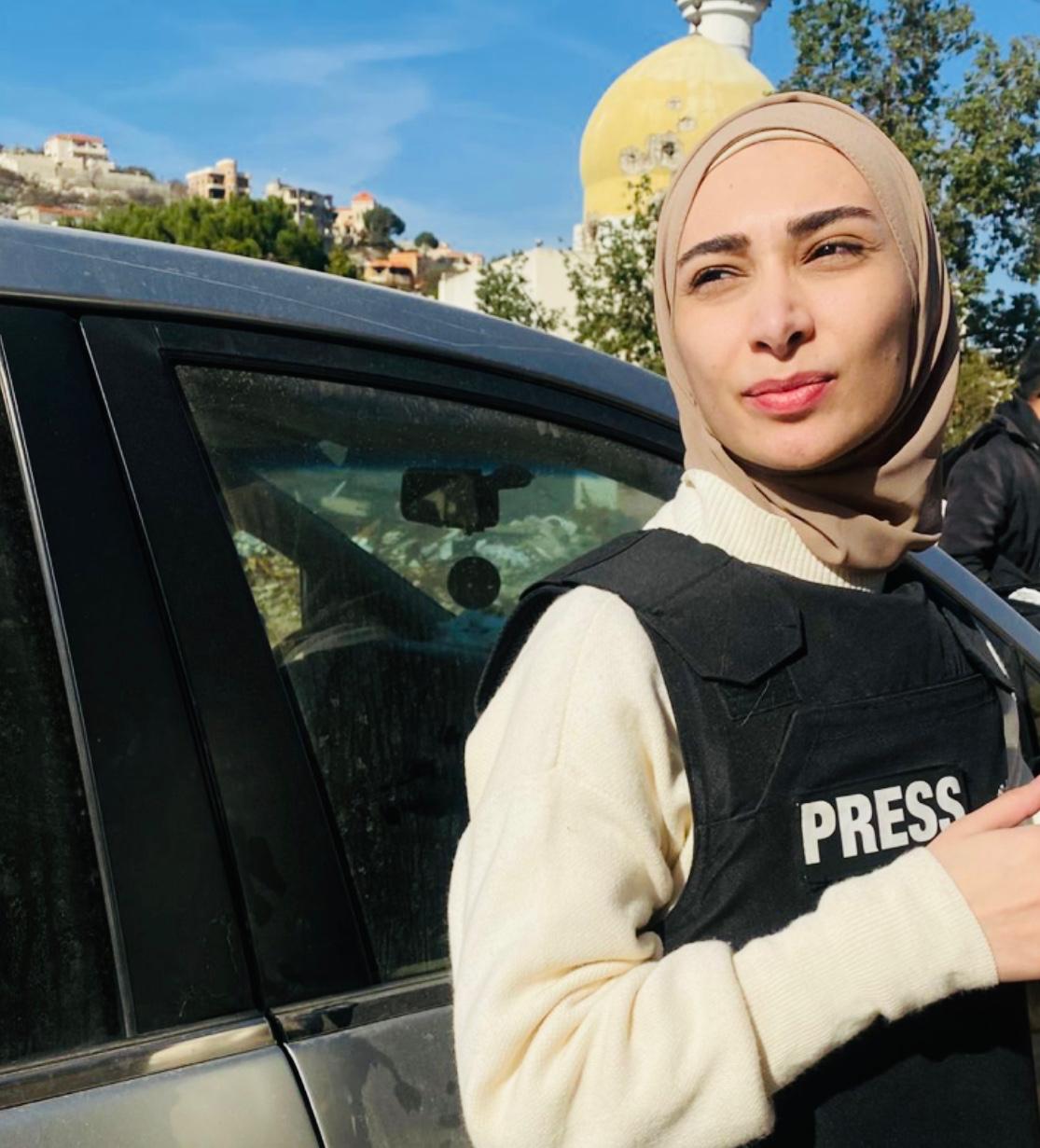تواجه الصحفيات في لبنان تحديات عديدة، حيث تتعرض الناشطات منهن لضغوط اجتماعية ونفسية وعقائدية مكثفة، خاصة على مواقع التواصل الاجتماعي. ويزداد هذا الضغط على من يعملن في مجالات النقد السياسي والصحافة الاستقصائية، حيث يواجهن هجمات متكررة وإهانات من قبل الجمهور ومستخدمي وسائل التواصل الاجتماعي المؤيدين للأحزاب السياسية.
أحد العوامل الرئيسية التي تدفع هؤلاء إلى شن هجمات مسيئة هو الاختلاف السياسي والطائفي، الذي تغذيه الخطابات السياسية المستمرة، مما أسهم في خلق بيئة معادية للصحافة في البلاد، وأدى إلى استهداف الصحفيات بشكل خاص.
تتعرض الصحفيات لتهديدات بالقتل، والتعرض لعوائلهن، والتحرش الجنسي، والتهديدات القانونية، إذا تناولن قضايا فساد تخص أحد السياسيين أو أحد أتباعهم. وحسب إحصاء أجرته منظمة "مراسلون بلا حدود"، فإن 30 بالمئة من الانتهاكات (من أصل 140 انتهاكا) خلال تحركات 17 تشرين 2019 استهدفت الصحفيات، الأمر الذي أدى بالصحفية مريم سيف العاملة في جريدة نداء الوطن إلى الفرار من البلد.
تتعرض الصحفيات لتهديدات بالقتل، والتعرض لعوائلهن، والتحرش الجنسي، والتهديدات القانونية، إذا تناولن قضايا فساد تخص أحد السياسيين أو أحد أتباعهم.
وفي أواخر عام 2023 أجرت مؤسسة مهارات استطلاع رأي مع 40 صحفية، بهدف تقييم الوعي العام والاستعداد للتصدي للمخاطر الرقمية المتعلقة بعملهن في لبنان. تظهر نتائج الاستطلاع أن 70 بالمئة من الصحفيات اللواتي عبّأن الاستمارة لا يشعرن بالأمان في أثناء ممارسة عملهن. وفيما يخص اهتمام المؤسسات الإعلامية بسلامة صحفياتها، فقد أشارت 36 صحفية من أصل 40 إلى أنهن لا يتلقين إرشادات أمنية فيما يتعلق بالمخاطر المتعلقة ببيئة العمل الصحفي.
الترهيب والابتزاز لممارسة الضغوطات المجتمعية
تتواصل أحيانا الحملات الإلكترونية والوسوم التي يطلقها رواد مواقع التواصل الاجتماعي ضد إحدى الصحفيات لأكثر من أسبوع، ما يتسبب لها بأضرار نفسية واجتماعية بسبب تغريدة أو منشور عبّرت فيه عن رأيها في قضايا عامة، أو لمجرد مشاركتها مقالاً أو ظهورها في وسيلة إعلامية.
ومن أبرز أشكال الضغط التي تتعرض لها الصحفيات محاولات سرقة حساباتهن، وإنشاء حسابات وهمية تحمل أسماءهن لنشر محتويات مسيئة، بالإضافة إلى تركيب صور مهينة، والتنمر، والاحتقار، والإساءة اللفظية. هذه الأساليب تستهدف النيل من كرامتهن ومحاولة إسكات أصواتهن.
تروي الصحفية والناقدة زينب حاوي لمجلة الصحافة تفاصيل الهجوم والحملة الإلكترونية التي شُنّت ضدها واستمرت ثمانية أيام عبر موقع إكس (تويتر سابقا)، إذ كانت تشتغل في قسم الثقافة في جريدة الأخبار وكان من مهامها رصد البرامج التلفزيونية.
أجرت كالعادة رصدا للبرامج الساخرة الكوميدية، فكتبت مقالا عن برنامج "تعا قلوا بيزعل" لتتحول مساحات النقاش الرقمي إلى مساحات تحريضية. تفاجأت حاوي بالحملة الموجهة تجاهها؛ إذ تعرضت لأشكال متعددة من العنف الكلامي الجارح ليخرج المقال عن سياقه الأساسي ويتحول إلى جدال شخصي بحت. تناول الجمهور على موقع إكس صورا لحاوي بإطار مسيء، في محاولة لترهيبها وابتزازها، حتى تذهب لخيار إلغاء المنشور الذي يحتوي على رابط المقال.
لم تتلق حاوي كما تقول أي دعم من الجمعيات النسوية التي تنصف المرأة وتدعي دعمها ومناصرتها. وبدا ذلك واضحا عندما عاد اسمها إلى التداول في واحدة من أهم برامج البودكاست المعروفة في لبنان و"الذي يدعي القيمون عليه الليبرالية وأنهم يتمتعون بسقف عالٍ من الحريات والانفتاح؛ إذ ذُكِر اسمها بدونية ورُبِط بمضامين التخلف والتعبير بمصطلحات جنسية مسيئة".
لم تنته الحملة على حاوي إلا بتسوية إدارية في صحيفة الأخبار، فبعد أن عملت 11 سنة في قسم النقد في الصحيفة، ونُقِلت بقرار من المسؤولين إلى قسم المجتمع، تؤكد حاوي أنها "لم تتلق أي دعم من مؤسستها في مواجهة هذه الحملة".
لم تتلق حاوي كما تقول أي دعم من الجمعيات النسوية التي تنصف المرأة وتدعي دعمها ومناصرتها. وبدا ذلك واضحا عندما عاد اسمها إلى التداول في واحدة من أهم برامج البودكاست المعروفة في لبنان و"الذي يدعي القيمون عليه الليبرالية وأنهم يتمتعون بسقف عالٍ من الحريات والانفتاح؛ إذ ذُكِر اسمها بدونية ورُبِط بمضامين التخلف والتعبير بمصطلحات جنسية مسيئة".
تفسر الصحفية والناشطة سحر غدار هذه النظرة إلى الصحفيات بأن اللبنانيين "وعلى الرغم من تنوعهم جميعا فإنهم ينتمون إلى بيئات ترى أن المرأة أقل شأنا من الرجل؛ لذا يُستسهل تعنيفها بشتى الطرق. يأتي التعنيف الرقمي ضد الصحفيات برأيها، بوصفه ورقة ضغط مضمونة النتائج تنتهي إما بإغلاق صفحاتهن أو الاعتذار.
غدار، وهي واحدة من أبرز الصحفيات المؤثرات في لبنان، مورس عليها ضغط وصل إلى اتهامها بتقاضي المال والطعن في الشرف في الفضاء الرقمي. كانت قد واجهت مواقف التنمر في أثناء مشاركتها في الاحتجاجات المطلبية في 17 تشرين 2019 أمام المصرف المركزي، ووصل الأمر إلى السخرية من شكلها. تقول غدار: "كنت أمر بوضع صحي اضطررت خلاله إلى تناول أدى إلى زيادة وزني، وقد قرأت كثيرا من التعليقات المسيئة وغير المنطقية والمسيئة بينما كنت أمارس حقي في التعبير والتظاهر".
تواصل غدار سرد قصتها بالقول: "تكررت تعليقات مثل "روحي اضعفي" "أنت صحفية أي تلفزيون بده يساعك؟" حتى إنه قد وصل الأمر مع بعضهم إلى تركيب صورها عبر برامج الفوتوشوب بقصد الإساءة والإزعاج وتشكيل ضغط اجتماعي عليها. تؤكد سحر أنه مهما كانت الصحفية تتمتع بشخصية قوية فستترك الكلمات الجارحة والمؤذية أثرا سلبيا، ولا سيما حين تتطور الأمور إلى التدخل بالحياة الشخصية والعائلية والوصول إلى الأطفال.
ترى نقيبة العاملين في المجال المرئي والمسموع الصحفية، رندلى جبور، أن كل المؤشرات تدل على أن الانفلات والعنف الرقمي بحق الصحفيات في لبنان قد ازداد مع أحداث السابع عشر من تشرين، و"لا تزال الاعتداءات على الصحفيات رقميا تزداد بشكل ملحوظ وقاسٍ، أكثر من الصحفيين الذكور حتى وإن تناولا الموضوعات والأفكار نفسها".
وتضيف النقيبة: "نعيش مع جماهير تستسهل التعرض لكرامة المرأة، والتطاول عليها للنيل منها؛ إذ يصبح من السهل اتهامها بشرفها، واستسخاف حديثها وتصويرها على أنها غبية وأدنى من الرجل مهما كان منصبها ورتبتها المهنية".
وبحسب معلومات النقابة، فإن إحدى الصحفيات حاولت الانتحار مؤخرا جراء الإساءات اللفظية والإهانات المتكررة والممنهجة عبر مواقع التواصل الاجتماعي، ما يعد مؤشرا خطرا على واقع عمل الصحفيات.
تؤكد سحر أنه مهما كانت الصحفية تتمتع بشخصية قوية فستترك الكلمات الجارحة والمؤذية أثرا سلبيا، ولا سيما حين تتطور الأمور إلى التدخل بالحياة الشخصية والعائلية والوصول إلى الأطفال.
من الناحية القانونية، تقول جبور إن النقابة توفر للصحفيات كامل الدعم من خلال تأدية دورها على الصعيد المعنوي والنفسي بمساندة الصحفيات بعد تعرضهن لأي أذى رقمي، ومن ناحية أخرى تقدم النقابة معونة قضائية، يتم فيها تعيين محامٍ للصحفية ومواكبة كاملة منذ اللحظة الأولى لتقديم الشكوى القانونية، لكن المشكلة على حد تعبيرها أن الصحفيات يستسلمن لهذه المواقف، حين يحكمن على النتائج مسبقا؛ لذلك أغلبهن يفضلن السكوت على الابتزاز والتعرض لحياتهن الشخصية.
يُذكَر أن قانون الإعلام في لبنان، الذي يفترض أن يكون المرجع لحل المشكلات كافة، لم يُعدَّل إلا مرة واحدة في فترة التسعينيات بمساهمة النقابة. أما التعديلات الحالية المطروحة في اللجان النيابية اليوم، فهي تقتصر على الإعلام التقليدي ولا تشمل منصات التواصل الاجتماعي.








































